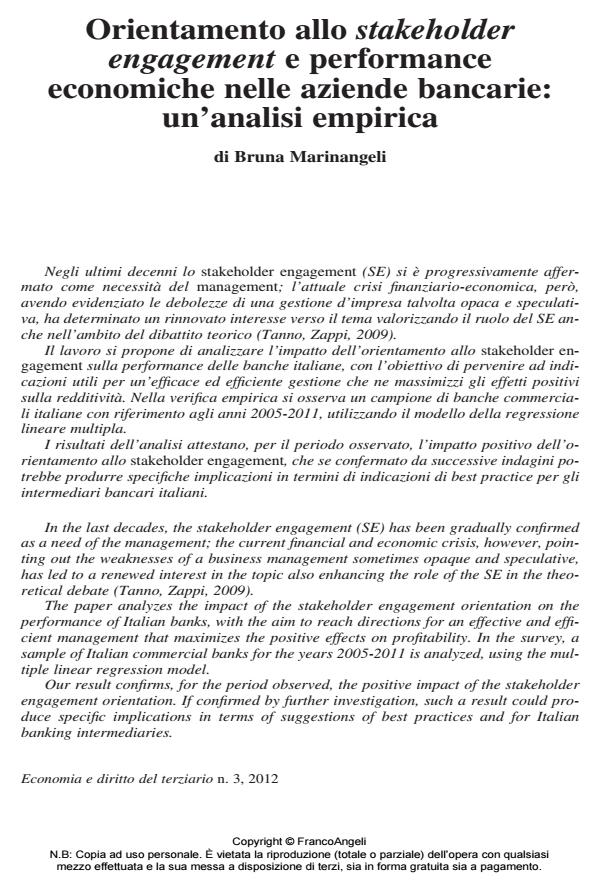Orientamento allo stakeholder engagement e performance economiche nelle aziende bancarie: un’analisi empirica
Titolo Rivista ECONOMIA E DIRITTO DEL TERZIARIO
Autori/Curatori Bruna Marinangeli
Anno di pubblicazione 2013 Fascicolo 2012/3
Lingua Italiano Numero pagine 17 P. 319-335 Dimensione file 500 KB
DOI 10.3280/ED2012-003001
Il DOI è il codice a barre della proprietà intellettuale: per saperne di più
clicca qui
Qui sotto puoi vedere in anteprima la prima pagina di questo articolo.
Se questo articolo ti interessa, lo puoi acquistare (e scaricare in formato pdf) seguendo le facili indicazioni per acquistare il download credit. Acquista Download Credits per scaricare questo Articolo in formato PDF

FrancoAngeli è membro della Publishers International Linking Association, Inc (PILA)associazione indipendente e non profit per facilitare (attraverso i servizi tecnologici implementati da CrossRef.org) l’accesso degli studiosi ai contenuti digitali nelle pubblicazioni professionali e scientifiche
Negli ultimi decenni lo stakeholder engagement (SE) si è progressivamente affermato come necessità del management; l’attuale crisi finanziario-economica, però, avendo evidenziato le debolezze di una gestione d’impresa talvolta opaca e speculativa, ha determinato un rinnovato interesse verso il tema valorizzando il ruolo del SE anche nell’ambito del dibattito teorico (Tanno, Zappi, 2009). Il lavoro si propone di analizzare l’impatto dell’orientamento allo stakeholder engagement sulla performance delle banche italiane, con l’obiettivo di pervenire ad indicazioni utili per un’efficace ed efficiente gestione che ne massimizzi gli effetti positivi sulla redditività. Nella verifica empirica si osserva un campione di banche commerciali italiane con riferimento agli anni 2005-2011, utilizzando il modello della regressione lineare multipla. I risultati dell’analisi attestano, per il periodo osservato, l’impatto positivo dell’orientamento allo stakeholder engagement, che se confermato da successive indagini potrebbe produrre specifiche implicazioni in termini di indicazioni di best practice per gli intermediari bancari italiani
Bruna Marinangeli, Orientamento allo stakeholder engagement e performance economiche nelle aziende bancarie: un’analisi empirica in "ECONOMIA E DIRITTO DEL TERZIARIO " 3/2012, pp 319-335, DOI: 10.3280/ED2012-003001